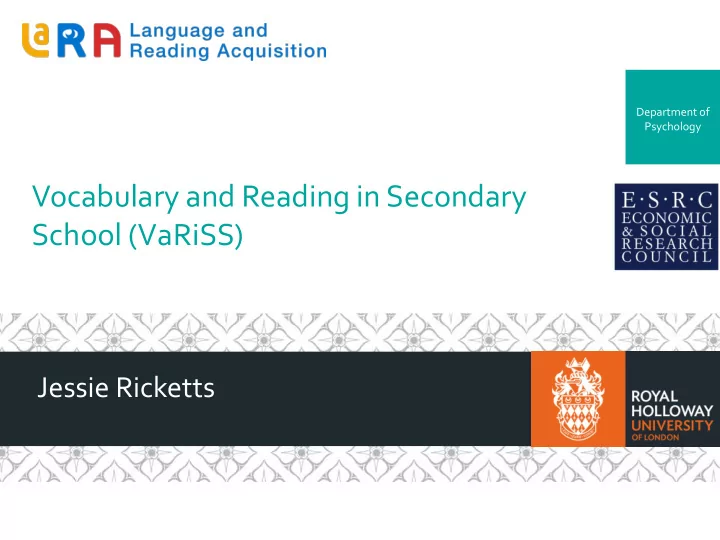

Department of Psychology Vocabulary and Reading in Secondary School (VaRiSS) Jessie Ricketts
Royal Holloway Vocabulary and Reading in Secondary Schools (VaRiSS) Project Department of Psychology Vocabulary Reading Vocabulary contributes to reading development Reading provides opportunities for new word learning Fostering reading and vocabulary is essential for learning across the curriculum ‘Reading to learn’ a particular focus in secondary school Little data on vocabulary and reading in secondary school 2
Royal Holloway Project overview Department of Psychology Vocabulary Reading Study 1: Longitudinal Vocabulary Reading Study 2: Learning new words with access to printed forms Study 3: Learning new words while reading – watch this space! 3
Longitudinal study 4
Royal Holloway Rationale Department of Psychology Vocabulary Reading 5
Royal Holloway Design and participants Department of Psychology 2013-2014 2014-2015 2015-2016 Phase 1 Phase 2 Phase 3 12.01 yrs (.33) 13.07 yrs (.34) 14.01 yrs (.33) unselected N = 208 N = 195 N = 186 48.6% girls 49.7% girls 48.4% 30 VaRiSS Analysed Phase 1 and 2 National Data collection 20 % of children Regional finishes this week! 10 0 FSM SEN EAL 6
Royal Holloway Method Department of Psychology 6 hours with each pupil (2 hours per year) Nonverbal reasoning Oral vocabulary (two measures) • Receptive, expressive, depth and breadth • Also, semantic relationships between words (where possible) Word-level reading (six measures) • Nonwords, regular words, irregular words, accuracy, efficiency Reading comprehension (one measure) • Minimum four passages (individual differences, reliability) 7
Royal Holloway Summary of results Department of Psychology Between 15% and 20% of pupils are experiencing reading difficulties at the beginning of secondary school. Can’t assume that secondary pupils can read effectively. Limited development in this period Remarkably high longitudinal stability in oral vocabulary, reading comprehension and word reading in early adolescence, indicating: • Good measurement • Performance at 12 years explains almost all/all of the variance at 13 years • Rankings are fixed No evidence for the hypothesised vocabulary – reading relationships 8
Orthographic facilitation 9
Royal Holloway Rationale Department of Psychology Does the presence of orthography facilitate oral vocabulary acquisition ? mammal “caracal” type of wild cat orthographic form eats birds Theoretical and practical motivation 10
Royal Holloway Background Department of Psychology Children more likely to learn words that have been taught with support from orthography • Typically developing children (Ricketts et al., 2009; Rosenthal & Ehri, 2008) , ASD (Lucas & Norbury, 2013, Ricketts et al., 2015) , SLI (Ricketts et al., 2015) and Down syndrome (Mengoni et al., 2013) Implications • Emphasise orthography whilst teaching new vocabulary • Incorporate into intervention approaches • In the classroom, strategy is common but not universal (66% in observations of 147 classrooms including pupils with SLCN) 11
Royal Holloway New directions Department of Psychology Instructions: compare explicit and incidental conditions for first time Replicate orthographic facilitation effect in older children (12-13y)? 12
Royal Holloway Words and procedure Department of Psychology 13
Royal Holloway Semantic learning ( M ± SE ) Department of Psychology Correct definition = 2, correct cued definition = 1, otherwise = 0 Thus max = 16 for each bar Collapsed by age (ns) • Orthography – p = .01 • Age - ns • Presentation – p = .03 14
Royal Holloway Conclusions Department of Psychology Equivalent learning in 9 and 12 year olds Orthographic facilitation for oral vocabulary learning • Consistent with previous studies • Using paradigm that teaches real polysyllabic words and richer semantic representations Explicitly emphasising orthography leads to benefit (but general) • General increase in engagement with the task? • Instructions prime participants to generate their own orthography? 15
Royal Holloway Take home messages Department of Psychology Longitudinal study • Some pupils have poor vocabulary and reading in the early secondary years • Little growth during this period of development • Rankings seem to be fixed Orthographic facilitation • Children and adolescents are more likely to learn words that have been taught with support from orthography • Especially if attention is drawn to orthography and how it could be useful 16
Royal Holloway Thanks and acknowledgements Department of Psychology To you for listening! Funding Research Assistance: • Nicky Dawson, Lucy Taylor, Rachael Sperring, Fay Bainbridge, Rachel Tomkinson, Natascha Ahmed, Keely Pridden, Rosie McGuire, Grace Pocock and Eva Dvorakova LARA lab: http://pc.rhul.ac.uk/sites/lara/people/; @ricketts_lara The VaRiSS project: www.variss.org; @varissproject; www.facebook.co.uk/varissproject 17
Recommend
More recommend